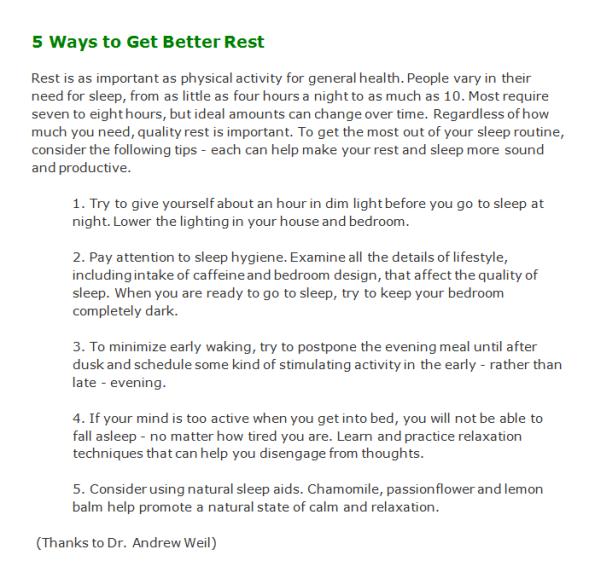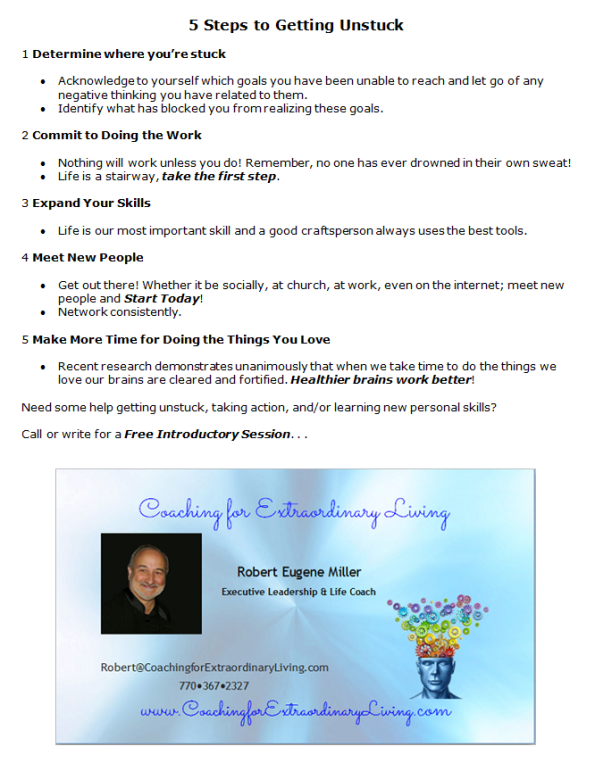Archive
4 Ways to Pump Up Your Workout Willpower
 We’re betting this is typical exercise motivation math: your old skinny jeans + a photo of a once-slinky you wearing them + next month’s high school reunion = a huge spurt of motivation to eat right and exercise fanatically. But whaddya do when that same motivation disappears faster than sunscreen ads in September?
We’re betting this is typical exercise motivation math: your old skinny jeans + a photo of a once-slinky you wearing them + next month’s high school reunion = a huge spurt of motivation to eat right and exercise fanatically. But whaddya do when that same motivation disappears faster than sunscreen ads in September?
Try something new, that’s what. Like these four surprising new motivation-boosters:
- Give yourself an “A” first. Yup, award yourself a gold star for deciding to start even before you start. New research suggests that it sets you up to do better automatically. Feeling good about yourself from the get-go makes it easier to choose oatmeal and fruit instead of that supersized onion bagel or to lace up your sneakers for a 30-minute walk instead of lingering over lunch. How to pre-reward yourself? You could literally paste an “atta way” sticker to your calendar, or buy yourself a spiffy new workout log, or just tell yourself, “Wow, it’s SO great that you’re finally doing this.”Evidence that advance back-pats work: In a University of Missouri study, when some students got blank test forms already marked with a big “A” before they took the test, they got 6 out of 7 questions right. When others were given blank forms topped with a big “F,” they got 3 to 4 questions right.
- See yourself on the red carpet. It’s an old trick of athletes, performers, and speech makers: Visualize yourself succeeding and you’re more likely to do just that. But there’s a new twist: Visualize others seeing you succeed, too (your boss, coach, spouse, gym buddy). It makes pulling off your project feel even more important. In a study from Canada’s York University, people who visualized themselves succeeding while an admiring crowd looked on felt more motivated to do well than those who just imagined watching themselves do well.
- Think like Bob the Builder. Stop bossing yourself around! When you give yourself pep talks, don’t make them too high pressure or turn them into guilt trips. Instead, when you think you’re finally ready to start a workout routine, instead of browbeating yourself to DO IT NOW, try enthusiastically asking yourself if you’re ready to commit (like Bob’s “Can we build it?”). In a study from the University of Illinois, volunteers who jotted down the words “Will I?” were more motivated to exercise (and solved puzzles better) than those who wrote down, “I will.”
- Put your “inner buddy” to work for you. Tap into the human brain’s “monkey see, monkey do” reaction. Think about it: When you see someone else doing something — running from a loud noise, yawning at a meeting, ordering a salad for lunch — your inner self starts thinking about doing the same thing, and the next thing you know, you’re actually doing it. The instinctive reaction to imitate others around you may be one reason that married couples are more likely to lose pounds and work out regularly when they do it together: When one sees the other doing something healthy (and vice versa), they almost can’t help imitating each other. But you don’t have to be married to make this work for you. Whether it’s your spouse, an exercise buddy or a diet support group, hanging out with people who are already doing what you want to (shedding inches, building rock-solid bodies) reinforces good behavior by automatically making you want to do the same thing. You know that old saw about imitation being the sincerest form of flattery? Looks like it’s also the sincerest form of de-fattery.
[Reprinted from sharecare]
30 Things to Stop Doing to Yourself (Art by RGuytano)
Marc and Angel, two passionate writers, life-hackers and “admirers of the human spirit,” have come up with an amazing list of 30 things to stop doing to yourself. If you like their list, make sure you check out their site and sign up to their amazing newsletter.
1. Stop spending time with the wrong people. – Life is too short to spend time with people who suck the happiness out of you. If someone wants you in their life, they’ll make room for you. You shouldn’t have to fight for a spot. Never, ever insist yourself to someone who continuously overlooks your worth. And remember, it’s not the people that stand by your side when you’re at your best, but the ones who stand beside you when you’re at your worst that are your true friends.
2. Stop running from your problems. – Face them head on. No, it won’t be easy. There is no person in the world capable of flawlessly handling every punch thrown at them. We aren’t supposed to be able to instantly solve problems. That’s not how we’re made. In fact, we’re made to get upset, sad, hurt, stumble and fall. Because that’s the whole purpose of living – to face problems, learn, adapt, and solve them over the course of time. This is what ultimately molds us into the person we become.
3. Stop lying to yourself. – You can lie to anyone else in the world, but you can’t lie to yourself. Our lives improve only when we take chances, and the first and most difficult chance we can take is to be honest with ourselves.
4. Stop putting your own needs on the back burner. – The most painful thing is losing yourself in the process of loving someone too much, and forgetting that you are special too. Yes, help others; but help yourself too. If there was ever a moment to follow your passion and do something that matters to you, that moment is now.
5. Stop trying to be someone you’re not. – One of the greatest challenges in life is being yourself in a world that’s trying to make you like everyone else. Someone will always be prettier, someone will always be smarter, someone will always be younger, but they will never be you. Don’t change so people will like you. Be yourself and the right people will love the real you.
 6. Stop trying to hold onto the past. – You can’t start the next chapter of your life if you keep re-reading your last one.
6. Stop trying to hold onto the past. – You can’t start the next chapter of your life if you keep re-reading your last one.
7. Stop being scared to make a mistake. – Doing something and getting it wrong is at least ten times more productive than doing nothing. Every success has a trail of failures behind it, and every failure is leading towards success. You end up regretting the things you did NOT do far more than the things you did.
8. Stop berating yourself for old mistakes. – We may love the wrong person and cry about the wrong things, but no matter how things go wrong, one thing is for sure, mistakes help us find the person and things that are right for us. We all make mistakes, have struggles, and even regret things in our past. But you are not your mistakes, you are not your struggles, and you are here NOW with the power to shape your day and your future. Every single thing that has ever happened in your life is preparing you for a moment that is yet to come.
9. Stop trying to buy happiness. – Many of the things we desire are expensive. But the truth is, the things that really satisfy us are totally free – love, laughter and working on our passions.
 10. Stop exclusively looking to others for happiness. – If you’re not happy with who you are on the inside, you won’t be happy in a long-term relationship with anyone else either. You have to create stability in your own life first before you can share it with someone else.
10. Stop exclusively looking to others for happiness. – If you’re not happy with who you are on the inside, you won’t be happy in a long-term relationship with anyone else either. You have to create stability in your own life first before you can share it with someone else.
11. Stop being idle. – Don’t think too much or you’ll create a problem that wasn’t even there in the first place. Evaluate situations and take decisive action. You cannot change what you refuse to confront. Making progress involves risk. Period! You can’t make it to second base with your foot on first.
12. Stop thinking you’re not ready. – Nobody ever feels 100% ready when an opportunity arises. Because most great opportunities in life force us to grow beyond our comfort zones, which means we won’t feel totally comfortable at first.
13. Stop getting involved in relationships for the wrong reasons. – Relationships must be chosen wisely. It’s better to be alone than to be in bad company. There’s no need to rush. If something is meant to be, it will happen – in the right time, with the right person, and for the best reason. Fall in love when you’re ready, not when you’re lonely
14. Stop rejecting new relationships just because old ones didn’t work. – In life you’ll realize that there is a purpose for everyone you meet. Some will test you, some will use you and some will teach you. But most importantly, some will bring out the best in you.
15. Stop trying to compete against everyone else. – Don’t worry about what others are doing better than you. Concentrate on beating your own records every day. Success is a battle between YOU and YOURSELF only.
16. Stop being jealous of others. – Jealousy is the art of counting someone else’s blessings instead of your own. Ask yourself this: “What’s something I have that everyone wants?”
17. Stop complaining and feeling sorry for yourself. – Life’s curveballs are thrown for a reason – to shift your path in a direction that is meant for you. You may not see or understand everything the moment it happens, and it may be tough. But reflect back on those negative curveballs thrown at you in the past. You’ll often see that eventually they led you to a better place, person, state of mind, or situation. So smile! Let everyone know that today you are a lot stronger than you were yesterday, and you will be.
18. Stop holding grudges. – Don’t live your life with hate in your heart. You will end up hurting yourself more than the people you hate. Forgiveness is not saying, “What you did to me is okay.” It is saying, “I’m not going to let what you did to me ruin my happiness forever.” Forgiveness is the answer… let go, find peace, liberate yourself! And remember, forgiveness is not just for other people, it’s for you too. If you must, forgive yourself, move on and try to do better next time.
 19. Stop letting others bring you down to their level. – Refuse to lower your standards to accommodate those who refuse to raise theirs.
19. Stop letting others bring you down to their level. – Refuse to lower your standards to accommodate those who refuse to raise theirs.
20. Stop wasting time explaining yourself to others. – Your friends don’t need it and your enemies won’t believe it anyway. Just do what you know in your heart is right.
21. Stop doing the same things over and over without taking a break. – The time to take a deep breath is when you don’t have time for it. If you keep doing what you’re doing, you’ll keep getting what you’re getting. Sometimes you need to distance yourself to see things clearly.
22. Stop overlooking the beauty of small moments. – Enjoy the little things, because one day you may look back and discover they were the big things. The best portion of your life will be the small, nameless moments you spend smiling with someone who matters to you.
23. Stop trying to make things perfect. – The real world doesn’t reward perfectionists, it rewards people who get things done.
24. Stop following the path of least resistance. – Life is not easy, especially when you plan on achieving something worthwhile. Don’t take the easy way out. Do something extraordinary.
25. Stop acting like everything is fine if it isn’t. – It’s okay to fall apart for a little while. You don’t always have to pretend to be strong, and there is no need to constantly prove that everything is going well. You shouldn’t be concerned with what other people are thinking either – cry if you need to – it’s healthy to shed your tears. The sooner you do, the sooner you will be able to smile again.
26. Stop blaming others for your troubles. – The extent to which you can achieve your dreams depends on the extent to which you take responsibility for your life. When you blame others for what you’re going through, you deny responsibility – you give others power over that part of your life.
27. Stop trying to be everything to everyone. – Doing so is impossible, and trying will only burn you out. But making one person smile CAN change the world: maybe not the whole world, but their world – so narrow your focus.
28. Stop worrying so much. – Worry will not strip tomorrow of its burdens, it will strip today of its joy. One way to check if something is worth mulling over is to ask yourself this question: “Will this matter in one year’s time? Three years? Five years?” If not, then it’s not worth worrying about.
29. Stop focusing on what you don’t want to happen. – Focus on what you do want to happen. Positive thinking is at the forefront of every great success story. If you awake every morning with the thought that something wonderful will happen in your life today, and you pay close attention, you’ll often find that you’re right.
30. Stop being ungrateful. – No matter how good or bad you have it, wake up each day thankful for your life. Someone somewhere else is desperately fighting for theirs. Instead of thinking about what you’re missing, try thinking about what you have everyone else is missing.
p.s. All images above are the work of RGuytano
Who is RGuytano?
www.RGuytano.com
My work is currently on display at www.RGuytano.30art.com
Beware of Tax Scams
If you receive an email or a message on your social networking site that appears to be from the IRS, it is probably a phishing scam. Read more about how the IRS does not initiate contact with taxpayers by email or any social media tools to request personal or financial information.
If you get an offer from someone that sounds too good to be true, then it probably is. For more information, see the IRS article, Tax Scams – How to Recognize and Avoid Them.
Get help with phishing scams, lottery fraud, and other types of scams
Restoring Order in the Brain
(Reprint from Neuroscience News)
Alzheimer’s disease is the most widespread degenerative neurological disorder in the world. Over five million Americans live with it, and one in three senior citizens will die with the disease or a similar form of dementia. While memory loss is a common symptom of Alzheimer’s, other behavioral manifestations — depression, loss of inhibition, delusions, agitation, anxiety, and aggression — can be even more challenging for victims and their families to live with.
Now Prof. Daniel Offen and Dr. Adi Shruster of Tel Aviv University’s Sackler School of Medicine have discovered that by reestablishing a population of new cells in the part of the brain associated with behavior, some symptoms of Alzheimer’s disease significantly decreased or were reversed altogether.
The research, published in the journal Behavioural Brain Research, was conducted on mouse models; it provides a promising target for Alzheimer’s symptoms in human beings as well.
“Until 15 years ago, the common belief was that you were born with a finite number of neurons. You would lose them as you aged or as the result of injury or disease,” said Prof. Offen, who also serves as Chief Scientific Officer at BrainStorm, a biotech company at the forefront of innovative stem cell research. “We now know that stem cells can be used to regenerate areas of the brain.”
Researchers discovered that by reestablishing a population of new cells in the part of the brain associated with behavior, some symptoms of Alzheimer’s disease significantly decreased or were reversed altogether. Credit ADEAR/NIA
Speeding up recovery
After introducing stem cells in brain tissue in the laboratory and seeing promising results, Prof. Offen leveraged the study to mice with Alzheimer’s disease-like symptoms. The gene (Wnt3a) was introduced in the part of the mouse brain that controls behavior, specifically fear and anxiety, in the hope that it would contribute to the formation of genes that produce new brain cells.
According to Prof. Offen, untreated Alzheimer’s mice would run heedlessly into an unfamiliar and dangerous area of their habitats instead of assessing potential threats, as healthy mice do. Once treated with the gene that increased new neuron population, however, the mice reverted to assessing their new surroundings first, as usual.
“Normal mice will recognize the danger and avoid it. Mice with the disease, just like human patients, lose their sense of space and reality,” said Prof. Offen. “We first succeeded in showing that new neuronal cells were produced in the areas injected with the gene. Then we succeeded in showing diminished symptoms as a result of this neuron repopulation.”
“The loss of inhibition is a cause of great embarrassment for most patients and relatives of patients with Alzheimer’s,” said Prof. Offen. “Often, patients take off their pants in public, having no sense of their surroundings. We saw parallel behavior in animal models with Alzheimer’s.”
Next: Memory
After concluding that increased stem cell production in a certain area of the brain had a positive effect on behavioral deficits of Alzheimer’s, Prof. Offen has moved to research into the area of the brain that controls memory. He and his team are currently exploring it in the laboratory and are confident that the results of the new study will be similar.
“Although there are many questions to answer before this research produces practical therapies, we are very optimistic about the results and feel this is a promising direction for Alzheimer’s research,” said Prof. Offen.
Secure Communications Thanks to Quantum Physics
By: Christian J. Meier
One of the recent revelations by Edward Snowden is that the U.S. National Security Agency is currently developing a quantum computer. Physicists aren’t surprised by this news; such a computer could crack the encryption that is commonly used today in no time and would therefore be highly attractive for the NSA.
Professor Thomas Walther of the Institute of Applied Physics at the Technical University of Darmstadt is convinced that “Sooner or later, the quantum computer will arrive.” Yet the quantum physicist is not worried. After all, he knows of an antidote: so-called quantum cryptography. This also uses the bizarre rules of quantum physics, but not to decrypt messages at a record pace; quite the opposite — to encrypt it in a way that cannot be cracked by a quantum computer. To do this, a “key” that depends on the laws of quantum mechanics has to be exchanged between the communication partners; this then serves to encrypt the message. Physicists throughout the world are perfecting quantum cryptography to make it suitable for particularly security-sensitive applications, such as for banking transactions or tap-proof communications. Walther’s Ph.D. student Sabine Euler is one of them.
As early as the 1980s, physicists Charles Bennett and Gilles Brassard thought about how quantum physics could help transfer keys while avoiding eavesdropping. Something similar to Morse code is used, consisting of a sequence of light signals from individual light particles (photons). The information is in the different polarizations of successive photons. Eavesdropping is impossible due to the quantum nature of photons. Any eavesdropper will inevitably be discovered because the eavesdropper needs to do measurements on the photons, and these measurements will always be noticed.
“That’s the theory” says Walther. However, there are ways to listen without being noticed in practice. This has been demonstrated by hackers who specialize in quantum cryptography based on systems already available on the market. “Commercial systems have always relinquished a little bit of security in the past,” says Walther. In order to make the protocol of Bennett and Brassard reality, you need, for example, light sources that are can be controlled so finely that they emit single photons in succession. Usually, a laser that is weakened so much that it emits single photons serves as the light source. “But sometimes two photons can come out simultaneously, which might help a potential eavesdropper to remain unnoticed” says Walther. The eavesdropper could intercept the second photon and transmit the first one.
Therefore, the team led by Sabine Euler uses a light source that transmits a signal when it sends a single photon; this signal can be used to select only the individually transmitted photons for communication. Nevertheless, there are still vulnerabilities. If the system changes the polarization of the light particles during coding, for example, the power consumption varies or the time interval of the pulses changes slightly. “An eavesdropper could tap this information and read the message without the sender and receiver noticing” explains Walther. Sabine Euler and her colleagues at the Institute of Applied Physics are trying to eliminate these vulnerabilities. “They are demonstrating a lot of creativity here” says Walther approvingly. Thanks to such research, it will be harder and harder for hackers to take advantage of vulnerabilities in quantum cryptography systems.
The TU Darmstadt quantum physicists want to make quantum cryptography not only more secure, but more manageable at the same time. “In a network in which many users wish to communicate securely with each other, the technology must be affordable,” he says. Therefore, his team develops its systems in such a manner that they are as simple as possible and can be miniaturized.
The research team is part of the Center for Advanced Security Research Darmstadt (CASED), in which the TU Darmstadt, the Fraunhofer Institute for Secure Information Technology and the University of Darmstadt combine their expertise in current and future IT security issues. Over 200 scientists conduct research in CASED, funded by the State Initiative for Economic and Academic Excellence (LOEWE) of the Hessian Ministry for Science and the Arts. “We also exchange information with computer scientists, which is very exciting,” says Walther.
After all, the computer science experts deal with many of the same issues as Walther’s quantum physicists. For example, Johannes Buchmann of the department of Computer Science at the TU Darmstadt is also working on encryption methods that theoretically cannot be cracked by a quantum computer. However, these are not based on quantum physics phenomena, but rather on an unsolvable math problem.
Therefore, it may well be that the answer to the first code-cracking quantum computer comes from Darmstadt.
Bizarre quantum physics and encryption
A quantum computer could quickly crack current encryptions because it can test very many possibilities simultaneously, in the same way as if you could try all possible variations for a password at once. After all, according to the quantum physics principle of superposition, atoms, electrons or photons can have several states simultaneously; for example, they can rotate clockwise and counterclockwise at the same time.
However, if you were to measure a property of a particle, such as the direction of rotation, the superposition is lost. This phenomenon is useful for quantum cryptography. Eavesdroppers inevitably betray themselves because their measurements of the photon change the photon’s characteristics. Moreover, quantum physics forbids them to copy the photon with all its properties. Therefore, they cannot siphon off any information to retransmit the uninfluenced photons on to the sender of the message.
Try These Tips for Better Sleep
The body needs rest, both to recover and become stronger after physical activity, and to recharge the mind after challenging mental tasks. Periodically being passive, taking in your surroundings without reacting, and simply not doing are valuable and necessary for optimum health.
Please read and pass along the information to anyone in your life who has trouble getting quality rest and sleep.
Actually, Taking Control is Easy
When Procrastination Is a Problem, and How to Fix It
By Paula Spencer Scott
Procrastination is a long word for this quick idea: later. It’s telling yourself you’ll do things “tomorrow” or “when I feel more like it.”
When is putting things off a problem?
Everyone delays or puts things off sometimes, and that’s fine, says Timothy Pychyl, PhD, an associate professor of psychology at Carleton University in Ottawa, Canada. You might postpone a meeting because of a schedule conflict, or to give yourself time to prepare. Procrastinating becomes a problem only when it hinders your relationships or getting your work done.
For about one in five adults, procrastination is a real, long-lasting problem.
Why we delay
The things people put off tend to be boring, hard, time-consuming, or maybe they lack meaning to us. Or we worry that the results won’t be perfect. When you avoid doing what seems less than pleasant, you get a little mood boost. But this bump doesn’t last. The avoided thing still hangs over you, causing guilt and stress.
The real reasons we procrastinate lie deep within human behavior. We tend to view things in the future as less real or concrete. The later risks of not doing something (or the rewards of getting it done) seem less real, too.
Putting things off is a habit. We’re wired to do what’s easy — in this case, delaying doing something we don’t find pleasant. And habits are hard to break.
How to get a move on
- Be concrete. Don’t say, “I’ll start the report in the morning.” Say, “I’ll outline just the three main points of the report while I drink my morning coffee, before I look at mail.”
- Be realistic about your time. We tend to be optimists about the future and think we’ll get more done than we do. Try jotting down all the things you have to do into your datebook. Include tasks like shopping for food, doing laundry, working out. That way when you make a plan to do something, you can get a true sense of what time you’ll have.
- “Pre-empt that which tempts,” Pychyl says. Shut off all the things that are a click away from distracting you. Social media and texting require little effort, give you a lot of mood reward, and suck time. Make them a reward after you finish.
- Know and accept that when the time comes to do the task, you won’t want to — and get past that. Just starting, even in the smallest way, creates progress. Then a sense of progress fuels well-being. “It’s an upward spiral,” Pychyl says.
- Start with the hardest tasks. Willpower is a muscle. You’ll better resist things that distract when you first get started.
- “Time travel” in your mind’s eye to when the task at hand is done. Think about how good you’ll feel.
- Pace yourself. Set aside time to make a little progress every day. College students who had to complete small amounts of work before they could go to the next level did better on tests than those who were given all the study material at once, a 2011 University of Kansas study found.
- Be kind to yourself. Praise yourself for taking the first steps. Assure yourself that a “good enough” effort is great, and better than putting things off.
Getting Unstuck!
Failure Is Part of the Game.

Even the most successful people have failed at some point or another. Actually, scratch that — especially the most successful people have failed at some point or another. (And probably a whole lot more than you might imagine.)
More. . .http://bit.ly/1krwdwn
#CforEL









